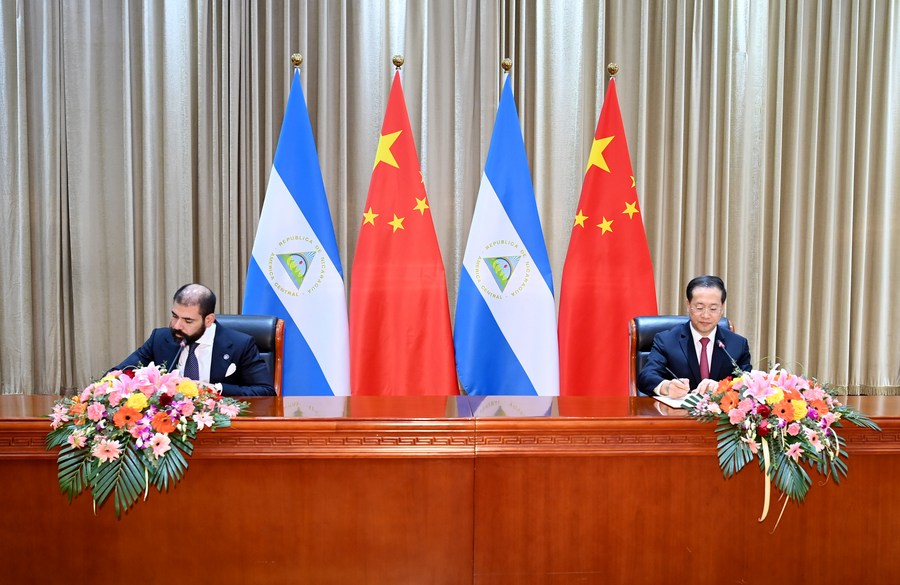Xinhua Commentary: Nicaragua makes the right decision on ties with China

China and Nicaragua sign the joint communique on the resumption of diplomatic relations between the People's Republic of China and the Republic of Nicaragua in north China's Tianjin, Dec. 10, 2021. (Xinhua/Yue Yuewei)
For the Central American country, standing with China is a righteous choice, as well as a choice that benefits the country and its people.
BEIJING, Dec. 10 (Xinhua) -- Nicaragua signed with China on Friday a joint communique on the resumption of diplomatic relations, severing the so-called "diplomatic ties" with China's Taiwan.
By recognizing the one-China principle, Nicaragua has followed some other Central American countries by making the right decision and choosing to stand on the right side of history.
Back in 2007, Costa Rica became the first country in the region to forge diplomatic ties with China in the new century. Four years later, a free trade pact between the two countries took effect, and bilateral trade has flourished ever since.
From 2007 to 2020, Costa Rica's exports to China increased nearly fivefold. The goods exported to China's market have seen expanding diversity, and bilateral cooperation in various fields continues to strengthen.

An exhibitor from Costa Rica makes coffee at Food and Agricultural Products exhibition area during the second China International Import Expo (CIIE) in Shanghai, east China, Nov. 9, 2019. (Xinhua/Zhang Yuwei)
After Costa Rica, Panama, Dominica and El Salvador also established diplomatic ties with China subsequently. Besides, Honduran presidential candidate Xiomara Castro vowed during her election campaign to establish diplomatic relations with China. All these have once again showed that the one-China principle accords with the will of the people and the trend of times, and is therefore unstoppable.
However, for quite some time, a handful of people in some countries have been going against the general trend and playing with fire on the Taiwan question. They attempt to challenge China's bottom line, and to suppress China by playing the "Taiwan card."
For example, a week before Honduras held its general election, U.S. Assistant Secretary of State for Western Hemisphere Affairs Brian A. Nichols rushed to the Central American country. He met with people from all walks of life in Honduras, and made clear to Honduran presidential candidates that the United States wants the country to maintain the so-called "diplomatic ties" with Taiwan.
People can tell right from wrong. It is a gross mistake if one believes that playing the "Taiwan card" could harm China's interests and disrupt its development. Washington's gimmickry has neither changed Honduras' presidential election result, nor prevented Nicaragua from making the righteous choice.
There is but one China in the world and Taiwan is an inalienable part of China's territory. It is a historical and legal fact that cannot be changed and also the real status quo that brooks no challenge.
Now, Nicaragua has become the 181st country that recognizes and supports the one-China principle. Its courage to make the decision deserves more respect and admiration at a time when the United States and Taiwan's Democratic Progressive Party authority are colluding to make waves across the strait.
For the Central American country, standing with China is a righteous choice, as well as a choice that benefits the country and its people.


